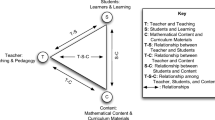Abstract
Regardless of the source of the curriculum, classroom teachers make the necessary and crucial, final decisions of specifically what and how to teach. This paper examines how three, fourth-grade teachers, who planned together voluntarily, decided what learning activities were “practical” for their students. In their seminal work, Doyle and Ponder (Interchange 8(3):1–12, 1977b) created a construct to describe how teachers decide if curriculum choices actually get implemented. They called their concept the Ethic of Practicality (EoP). Concisely, this concept is based on the premise that teachers use curricula that they find to be sensible and realistic. Doyle and Ponder devised this model to address the question of why some curriculum innovations get used and therefore succeed, while others fail. The EoP was adapted in this paper to examine the processes used in making curriculum choices by a teacher planning group who met voluntarily. The EoP’s original intent was as a model for understanding why teachers use some curriculum innovations while rejecting others. This article uses the EoP to explore the satisfaction expressed by three teachers in their team curriculum planning process. This discussion centers on the question, “Did the teachers continue their voluntary planning sessions because the resultant curriculum products were ‘practical?’” The teacher trio apparently regarded their planning sessions as highly practical and therefore continued to meet after school hours to plan their lessons. Examples demonstrate that the planning process satisfied the teachers in terms of the three components of the EoP: instrumentality, congruence, and cost.
Similar content being viewed by others
References
Crocker, R. K. (1984). Determinants of implementation of an elementary science program. Journal of Research in Science Teaching, 21(2), 211–220. doi:10.1002/tea.3660210211.
Cviko, A., McKenney, S., & Voogt, J. (2011). Teachers enacting a technology-rich curriculum for emergent literacy. Educational Technology Research and Development. Advance Online Publication. doi:10.1007/s11423-011-9208-3.
Doyle, W., & Ponder, G. (1977a). The ethic of practicality: Implications for curriculum development. In A. Molar & Zahorik (Eds.), Curriculum theory (pp. 74–80). Alexandria, VA: Association for Supervision and Curriculum Development.
Doyle, W., & Ponder, G. (1977b). The practicality ethic in teacher decision-making. Interchange, 8(3), 1–12. doi:10.1007/BF01189290.
Edwards, R., Miller, K., & Priestley, M. (2009). Curriculum-making in school and college: The case of hospitality. Curriculum Journal, 20(1), 27–42. doi:10.1080/09585170902763981.
Herbst, P., Nachlieli, T., & Chazan, D. (2011). Studying the practical rationality of mathematics teaching: What goes into “installing” a theorem in geometry? Cognition and Instruction, 29(2), 218–255. doi:10.1080/07370008.2011.556833.
Lai, E. (2010). Getting in step to improve the quality of in-service teacher learning through mentoring. Professional Development in Education, 36(3), 443–469. doi:10.1080/19415250903115962.
Lutterodt, S. A. (1981). Design, utilization. Some problems associated with integrated science curricula with special reference to the project for science integration in Ghana. International Review of Education, 27(3), 301–314.
Munby, H. (1984). A qualitative approach to the study of a teacher’s beliefs. Journal of Research in Science Teaching, 21(1), 27–38. doi:10.1002/tea.3660210104.
Reid, M. J. (2009). Curriculum deliberations of experienced elementary teachers engaged in voluntary team planning. The Curriculum Journal, 20(4), 409–421. doi:10.1080/09585170903424955.
Reid, M. J. (2010). Commonplaces in practitioner curriculum deliberation. Research in the Schools, 17(2), 54–64.
Schwab, J. (1973). The practical 3: Translation into curriculum. School Review, 81, 501–522. doi:10.1086/443100.
Zeichner, K. M. (1981). Reflective teaching and field-based experience in physical education. Interchange, 12(4), 1–22.
Author information
Authors and Affiliations
Corresponding author
Rights and permissions
About this article
Cite this article
Reid, M.J. Ethic of Practicality Analysis of Successful Group Curriculum Planning by Teachers. Interchange 45, 75–84 (2014). https://doi.org/10.1007/s10780-014-9222-6
Received:
Accepted:
Published:
Issue Date:
DOI: https://doi.org/10.1007/s10780-014-9222-6




